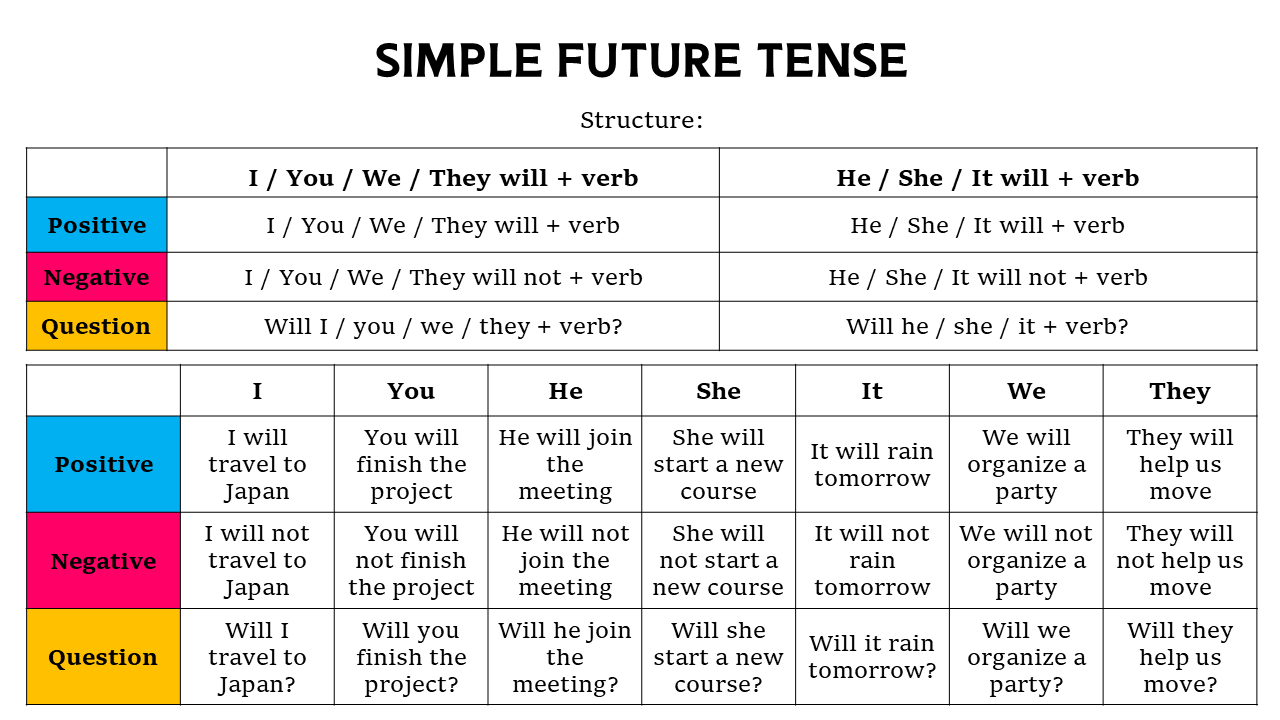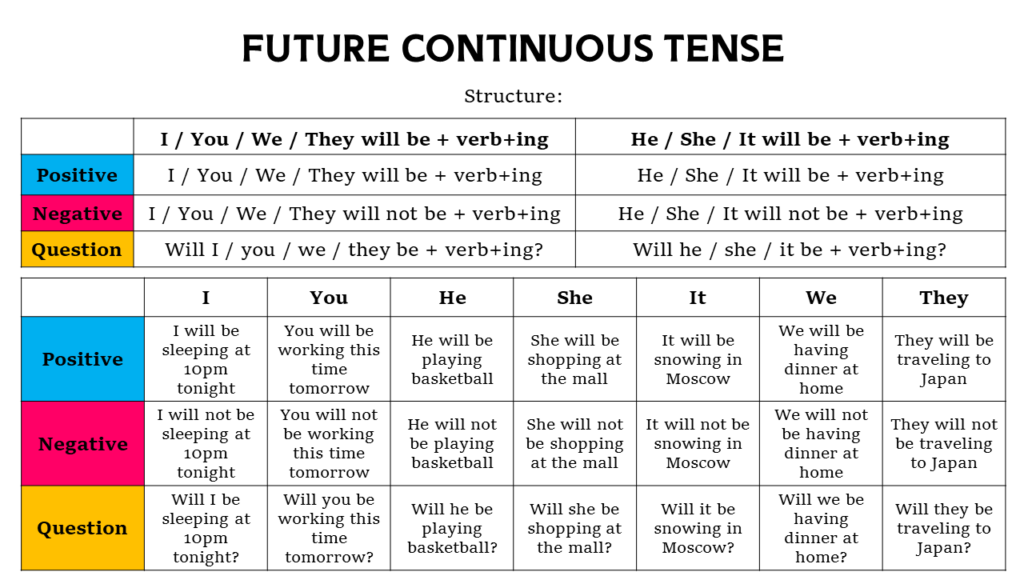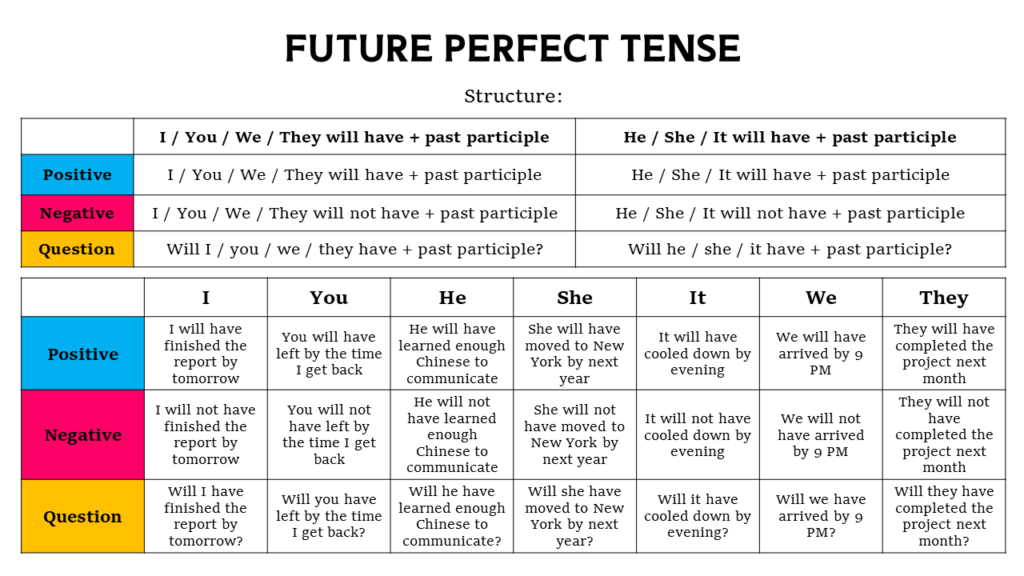In the vast expanse of English grammar, the simple future tense serves as a beacon for actions yet to unfold, promising a realm of possibilities and intentions. It’s our linguistic vessel to express future plans, predictions, and decisions made at the moment of speaking, inviting us to ponder over the myriad of events that the future holds.
Definition
The simple future tense is employed to describe actions that are yet to occur. It’s the tense of anticipation, used for making predictions, stating intentions, or decisions that are made at the speaking moment, rather than premeditated plans.
Formula/Structure
Crafting sentences in the simple future tense often involves the auxiliary verb “will” followed by the base form of the main verb. The structure is straightforward yet powerful in its ability to capture the essence of future actions. Here’s a closer look:
- Affirmative: Subject + will + base form of the verb
- Example: “I will travel to France next year.”
- Negative: Subject + will not (won’t) + base form of the verb
- Example: “She will not (won’t) attend the meeting tomorrow.”
- Interrogative: Will + subject + base form of the verb?
- Example: “Will you join us for dinner?”
Rules with Examples
- ‘Will’ for all subjects: Unlike other tenses, ‘will’ remains constant regardless of the subject. “He will finish his work.”
- Instant decisions: Use the simple future for decisions made at the moment of speaking. “It’s cold. I will close the window.”
- Predictions without evidence: When predicting the future without concrete evidence. “I think it will rain tomorrow.”
How to Make Simple Future Tense?
1. Positive Simple Future Tense
Use “will” followed by the verb to express a future action or intention.
2. Negative Simple Future Tense
Add “not” after “will” to indicate an action that will not take place in the future.
3. Interrogative Simple Future Tense
Begin with “will,” then the subject, followed by the verb, to ask about future possibilities or intentions.
Examples of Simple Future Tense
Examples of Positive Simple Future Tense
- “We will celebrate our anniversary by going out.”
- “They will start the project next week.”
- “He will buy a new car soon.”
- “I will make dinner tonight.”
- “You will do great in your exam.”
- “It will be fun.”
- “She will take the 10 o’clock train.”
- “The movie will begin at 9 PM.”
- “Our team will win the match.”
- “The sun will rise at 6 AM tomorrow.”
Examples of Negative Simple Future Tense
- “I won’t go to the party tonight.”
- “He won’t agree to the terms.”
- “They won’t finish the work by today.”
- “She won’t mind if you come late.”
- “We won’t use plastic bags anymore.”
- “You won’t regret this decision.”
- “It won’t be easy.”
- “The train won’t leave until 5 PM.”
- “The shops won’t open on New Year’s Day.”
- “He won’t forget your kindness.”
Examples of Interrogative Simple Future Tense
- “Will you help me with this?”
- “Will they join us for lunch?”
- “Will he accept the offer?”
- “Will it be sunny tomorrow?”
- “Will she be at the meeting?”
- “Will we see you at the event?”
- “Will the train arrive on time?”
- “Will you marry me?”
- “Will the project be completed on schedule?”
- “Will I find the right path?”

Exercise of Simple Future Tense With Answers
Questions
- I (to move) to a new city next month.
- She (not to use) her phone during the flight.
- (you to join) us for dinner tonight?
- They (to launch) the new product line tomorrow.
- He (not to participate) in the competition.
- (it to be) cold tomorrow?
- We (to hold) a meeting to discuss the changes.
- The movie (not to start) until 8 PM.
- (she to bring) the documents to the office?
- You (to understand) the importance of this decision.
Answers
- I will move to a new city next month.
- She won’t use her phone during the flight.
- Will you join us for dinner tonight?
- They will launch the new product line tomorrow.
- He won’t participate in the competition.
- Will it be cold tomorrow?
- We will hold a meeting to discuss the changes.
- The movie won’t start until 8 PM.
- Will she bring the documents to the office?
- You will understand the importance of this decision.
The simple future tense opens up a world of future possibilities, allowing us to share our plans, predictions, and spontaneous decisions with clarity and confidence. By mastering this tense, you can navigate future conversations with ease, expressing your hopes, dreams, and plans with precision.


